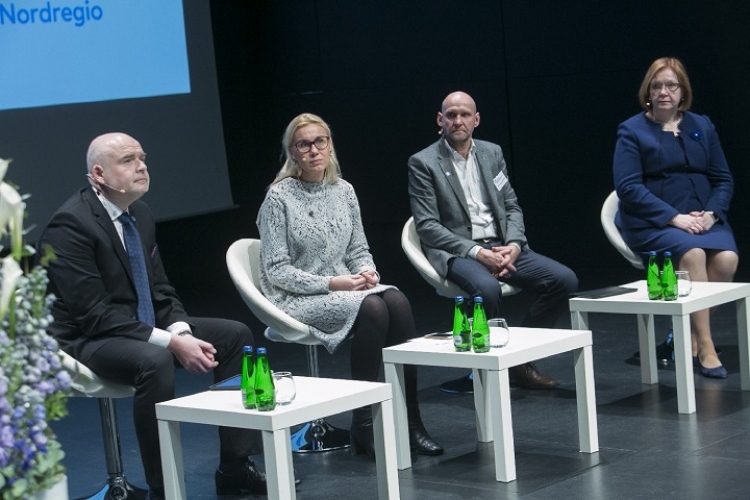
Changes in Migration Policies and Integration of New Arrivals to Labour Market
The Nordic-Baltic migration conference held at KUMU, Tallinn 22 March 2018 focused on the new challenges of migration policies, including issues concerning integration to labour market, tackling illegal employment of third-country nationals, well-being and managing cultural diversity in the migratory era. Professor Raul Eamets from the University of Tartu talked about defining smart migration policies in the keynote speech of the conference. Professor Olof Åslund from Uppsala University, the Director-General at the Swedish Institute for Evaluation of Labour Market and Education Policy, and Matti Sarvimäki, Associate Research Professor at the VATT Institute for Economic Research in Finland, presented the Swedish experiences on labour market entry of non-labour migrants and about integration of immigrants into the Finnish labor market.
The following presentations and panel discussions of the conference pointed out one of the aspects of the labour market integration of new arrivals concerning illegal employment of third-country nationals (TCNs). This topic is also linked to trafficking in human beings for labour exploitation. One of the aims of the conference was to provide an overview of the current state of affairs, which was then followed by a panel discussion on how to move forward with countering illegal employment of third-country nationals in the future, on the issues that need to be addressed first and the possible strategies for addressing them. It was pointed out that illegal employment is more prevalent in labour-intensive and low-skilled sectors with a high turnover of staff and low wages. The sectors in which illegal employment is most prevalent include agriculture, construction, manufacturing, hospitality and catering services. According to the studies, the main challenges for employers are monitoring, detecting and providing proof of illegal employment, which is a time-consuming and difficult process; and the additional difficulty of providing proof that the criteria for qualifying a case as a crime of human trafficking are met. At the same time, the main challenges for TCNs are limited accessibility of information on employment rights due to language barriers and the overall lack of preventive measures targeting TCNs in particular. Combating illegal employment is a policy objective at the EU level as well as the Member States level.
The Member States find the most effective measures in the fight against illegal employment to be:
- foreseeing and imposing sanctions – a preventive measure to deter the employers;
- establishing partnerships and sharing intelligence among different bodies and organisations at the national level;
- developing and using electronic services to enable the employers to check whether the TCN has the right to work.
The last panel of the conference introduced policies and measures for speeding up labour market integration of refugees. Hjördís Rut Sigurjónsdóttir from Nordregio touched upon the latest developments in this field in the Nordic region. Piret Hartman, the Undersecretary for Cultural Diversity, Estonian Ministry of Culture, gave an overview of the challenges facing the Estonian integration policy. Henrik Emilsson from Malmö University Institute for Studies of Migration, Diversity and Welfare spoke about how to measure the effectiveness of integration and about the indicators of integration.
Results of the conference:
- The Nordic-Baltic Migration Conference 2018 brought together immigration researchers as well as policy makers in the field of migration and integration from the Nordic and Baltic countries and several International organisations, such as ILO, OECD, Nordregio. The conference gave a floor to several high level speakers, among others the Minister of the Interior of Estonia Andres Anvelt, the Minister of Economic Affairs and Infrastructure Kadri Simson, Members of Parliament of Estonia Maris Lauri and Helir-Valdor Seeder. It served as a valuable and highly efficient platform for professional networking and a forum for public discussion.
- Presentations from different countries focusing on the experience of admitting and adopting immigrants, including the recipients of international protection, were very useful for informing policy making in those complex fields. The best practices that could be followed, as well as lessons to be avoided were disseminated in the conference.
- The European Migration Network (EMN) presented the results of its recent study ‘Illegal Employment of Third-Country Nationals in the EU: Challenges and Solutions’ to a numerous international audience. The feedback from the audience was valuable in continuing EMN’s work in this field.
- The conference intensified cooperation between the University of Tartu, the Nordic Council of Ministers and the European Migration Network. The national network included also other relevant government agencies and non-governmental organisations. The conference was organized in collaboration with the Swedish Embassy in Tallinn, the Migration Institute of Finland, Malmö Institute for Studies of Migration, Diversity and Welfare, Nordregio, Ministry of the Interior of Estonia, Ministry of Foreign Affairs of Estonia, Ministry of Culture of Estonia and many other partners. Such a positive cooperative relationship encourages further cooperation in organising events and initiatives in Estonia the field of migration and integration. Thus, the next joint conference on student migration to the region has already been planned to 29 March 2019.